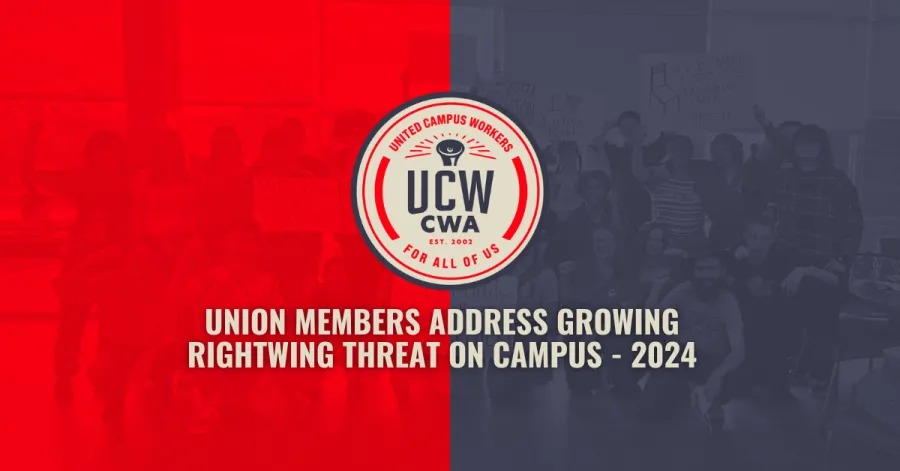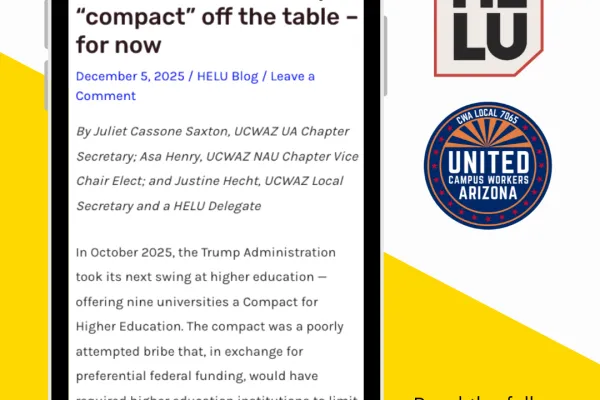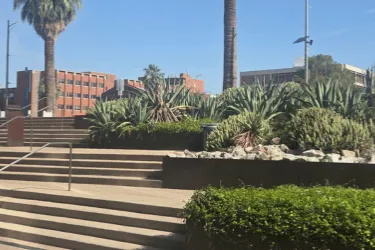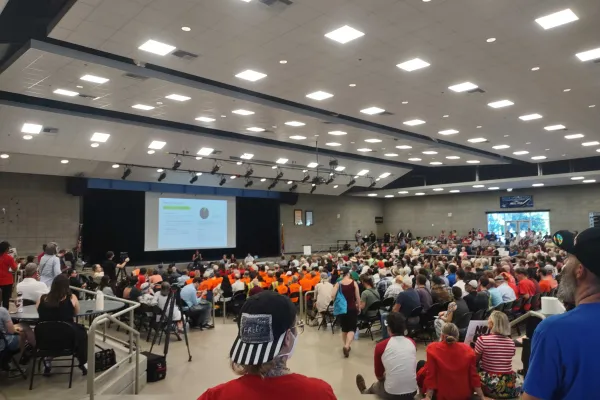Union Members Address Growing Rightwing Threat on Campus

Union Members Address Growing Rightwing Threat on Campus
Attacks on Curriculum, Diversity and Funding Undermine Role of Education
Introduction
Higher education labor and social justice organizing are in a historic upswing. Unfortunately, at the same time—and in direct response—the Right is waging an unprecedented assault on institutions, workers, and students. Rightwing pundits, legislators, and think tanks have threatened the future of higher education, making this onslaught a core part of their overall strategy to consolidate power. Attacks on curriculum; affirmative action; diversity, equity, and inclusion (DEI) programming; democratic governance; state and federal funding; and, the very mission of higher education in a democratic society are now prevalent.
The Right often frames higher education as an elite privilege that only a few have access to. While there is significant work to be done to make higher education truly accessible, this politically-motivated rhetoric is meant to undermine the institution entirely and is not in line with the facts. In recent years postsecondary education enrollment has been on the rise. In 2021, 48% of U.S. residents had attended a postsecondary education program and 38% had completed at least a bachelor’s degree (footnote 1). Higher education provides an essential service: to educate, train, and develop critical, engaged, and knowledgeable residents prepared to join the workforce and participate in society in ways that enrich our democracy and world. When the institution of higher education is under attack, the health and well-being of our communities are threatened.
Rightwing efforts to gut higher education are not new, but the scale, force, and success of emerging tactics, often employed by rightwing extremists, is cause for heightened concern and attention. These attacks threaten to further undermine a higher education system that has already been left beleaguered and weak from funding cuts and increased corporate control.
Much attention has been paid to changes to the college and university workforce through defunding, outsourcing, and corporate influence. Scholars and journalists have also closely analyzed the history of culture wars on college campuses, including recent direct political attacks often framed as a “war on woke.” The connection between defunding, low pay and precarity, and the recent political attacks has not been as closely examined, however.
This report reveals that in the context of an already precarious workforce—struggling with low wages, increased workloads, and a lack of voice in decision making—attacks on freedom on college campuses compound with existing issues, creating a heightened crisis.
Surveys and interview data analyzed in this report come from union members across 10 Southeast and Southwest states, where workers’ rights and wages are suppressed and the recent attacks on higher education have been most severe. The experiences of these members provide a bellwether for future trends in higher education if rightwing extremists are not defeated in the presidential election and by building political and labor power at the state and local levels in the decade to come.
Top findings in this report include the following:
- Survey respondents are highly concerned about (1) policies that attempt to control or freeze speech, teaching, or research on issues and topics deemed controversial; (2) the elimination or reduction of diversity, equity, and inclusion (DEI) programs; and (3) worsening pay and benefit packages.
- Survey and interview participants shared examples of faculty and students targeted by physical attacks, harassment (online and in-person), stalking, and even death threats by individuals or groups taking up the rightwing call to wage a “war on woke.”
- Survey respondents reported outcomes they have experienced as a result of the political attacks:
- 176 respondents, 84%, reported “a feeling of low morale or burnout;”
- 169, 81%, reported “a feeling of fear or anxiety;”
- 92, 59%, indicated that their department has trouble attracting and retaining qualified employees and their coworkers are actively looking for other jobs;
- 90, 43%, shared that they are actively looking for another job or considering early retirement due to the political attacks in higher education;
- 51, a quarter, report that they are experiencing increased harassment, discrimination, or disrespect in the current climate of higher education.
- Respondents from across job titles detailed the impact of political and administrative pressures on academic freedom, leading to self-censorship, a chilling effect on teaching subjects deemed “controversial” and a stifling of free speech, open discourse, and critical thinking.
- Interview and survey data reveal that the political climate, combined with increasing workloads, and without a corresponding increase in pay or support, creates a particularly challenging work environment. Budget cuts and resource shortages lead to higher teaching loads, fewer full-time faculty hires, and reduced support for students, workers, and community members.
- Survey and interview participants indicated that the political attacks have led to a decline in the overall quality of services at their institution.
- 122 respondents, 60%, shared that students are experiencing mental health crises without adequate support;
- 115, 56%, indicated that learning outcomes are compromised, and students or other vulnerable populations are unsafe;
- 102, half, say that critical programs or services have been cut;
- 70, one-third, report that class sizes have increased;
- 54, a quarter, shared that research outcomes are compromised.
Background
Higher Education is Facing an Unprecedented Assault
Before the far-right obsession with higher education in the U.S., corporate-influenced Republicans and Democrats focused their attacks on funding cuts and policy incentives that reward profit-driven programs and a free market approach to education (footnote 2). In the absence of adequate public funding, tuition-reliant institutions compete for students with luxury facilities and sport complexes while expensive tuition and fees send students and families into debt. Board members from Fortune 500 companies and Wall Street pass policies that lead to risky and aggressive debt and investment strategies, top-down management structures, and decision-making motivated by profit rather than missions focused on high-quality education and research (footnote 3). These historic neoliberal reforms undermine higher education as a site of critical learning, democracy, and workers’ rights and require continued vigilance to defeat. But the far Right’s focus on taking institutions over to build indoctrination centers requires heightened attention.
In 2023, Vox reporter Fabiola Cineas reported on Ron Desantis’ “unparalleled’ assault on higher education” in the state of Florida (footnote 4), drawing the connection between Desantis and a full-blown political strategy employed by far-right political actors across the country (footnote 5). Desantis and other far-right conservatives want to take over the education sphere to build far-right ideological training centers. Chris Rufo, one of the architects of this ideological pole, told a New Yorker reporter in 2021 that one of the objectives of his work is to “take some of these essentially corrupted state agencies, contest them, and then create rival power centers within them (footnote 6).” Desantis, Rufo, and others in their camp have taken this up as a central, long-term political priority. Unfortunately, their influence is growing, with far-reaching consequences and global implications.
A report by the American Association of University Professors released in May 2023 tracks right-wing state legislation around the country between 2021 and 2023 and the role that 11 well-funded right-wing think tanks have played in funding a no-holds-barred policy and propaganda campaign designed “to roll back the political, social, and cultural gains made in the wake of the Black Lives Matter movement and increased queer and trans visibility (footnote 7).” An opinion piece published by Paris’ Le Monde connects the political attacks on higher education in the U.S. to similar historic strategies employed in Hungary, Turkey, and Brazil (footnote 8).
In late 2023 and throughout 2024, the war in Gaza and the campus-based activism calling for a ceasefire has added a new charge to politically-motivated attacks. According to Reuters, protests on campuses around the country the week of April 22, 2024 led to over 550 arrests (footnote 9). As Human Rights Watch and the American Civil Liberties Union spoke out against arrests of protesters and urged authorities to respect freedom of speech (footnote 10), law enforcement, working with politicians and campus administrators, deployed tasers, tear gas, and, at UT Austin in Texas, even sent in state troopers on horseback clad in riot gear (footnote 11).
In 2023 the Chronicle of Higher Education started tracking legislation with language prohibiting diversity, equity, and inclusion programming and other “proscriptions identified in model state legislation proposed by the Goldwater Institute and the Manhattan Institute (footnote 12).” As of August 2024 they identified 28 states where 85 bills were introduced, 14 of which have become law (footnote 13).
Thousands of CWA members are experiencing these laws on the books firsthand in Alabama, Florida, Tennessee and Texas. In states with CWA members where one or more bills were introduced but did not pass last year, including Arizona, Georgia, Kentucky, Louisiana, Mississippi, Ohio, and South Carolina, members anticipate reintroduction of bills and experience the chilling effect of a growing rightwing political base. For instance, in many of these states members share examples of institutions preemptively cutting or scaling back diversity-related programs and centers in attempts to avoid laws being passed, or further scrutiny from lawmakers. In September 2024 administrators at the University of Kentucky and Northern Kentucky University took steps to cut DEI programming even though a 2023 attempt to pass a law against these programs failed in the legislature. The president of NKU announced the cuts in a letter to employees, noting that: “The circumstances under which universities across the commonwealth and the country find themselves, coupled with the legislative priorities of state leaders for the upcoming session, require universities to change (footnote 14).”
Research Methods
Between July and September 2024, CWA’s Public, Healthcare and Education Workers (PHEW) office conducted background research on these political attacks, including surveying 210 CWA members working at higher education institutions across 10 states. Survey questions asked about the nature and scope of recent attacks and how they have impacted workers and the services they are able to provide. Follow-up interviews were conducted with six workers surveyed in order to fully understand the depth of common experiences and feelings. Survey response rates by state are as follows:
- Arizona, 54 (26% of total respondents)
- Tennessee, 42 (20%)
- Georgia, 30 (14%)
- Kentucky, 28 (13%)
- Louisiana, 15 (7%)
- Alabama, 12 (6%)
- Florida, 10 (5%)
- South Carolina, 4 (2%)
- Texas, 2 (1%) and Colorado, 1 (.5%)
Survey respondents included a diverse sample of job titles, including over 100 faculty, 56 staff, and 49 graduate workers.
In addition to the August 2024 survey, a survey administered by CWA’s research department in partnership with the Texas State Employees Union (TSEU) and Every Texan in the Spring of 2024 collected data from 3,579 higher education employees at 26 public institutions. The TSEU survey included questions about the impact of SB 17, legislation outlawing DEI programs and curriculum passed in 2023 and implemented in 2024. Open-ended responses to questions about worker and student outcomes related to the legislation were coded for themes and were included in the analysis for this report.
Findings
Members Are Deeply Concerned About Rightwing Attacks
The survey asked respondents how concerned they are—from 1 (not concerned) to 10 (extremely concerned)—about commonly used tactics employed by the Right. On average the members surveyed indicated high levels of concern across all response options. The issues with the highest average levels of concern included:
- Policies that attempt to control or freeze speech, teaching, or research on issues and topics deemed controversial, which had an average rating of 9;
- The elimination or reduction of diversity, equity, and inclusion (DEI) programs, which had an average rating of 8.6;
- Worsening pay and benefit packages, with an average rating of 8.5.
The erosion of staff job security, the appointment of governing board members with anti-worker ideological agendas, and the appointment of upper-level administrators with anti-worker ideological agendas also had high average levels of concern—between 8.2 and 8.4.
The erosion of tenure protections had an average level of concern of 7.5 among all survey respondents, though among the 60 tenure-track/tenured faculty the average was 8.6. The restructuring of academic departments had an average of 7.3.
Open-ended questions in both the survey and interviews invited members to explain in more detail the nature of political attacks they have experienced on campus. Answers were analyzed and coded to identify common themes. The themes, including member quotes that represent them, are covered in detail in the sections below.
Diversity, Equity, and Inclusion: Attacks on Programming and People
Survey and interview responses reflect concerns about the growing influence of rightwing political and ideological agendas on higher education, including attacks on DEI, critical race theory, and LGBTQI+ rights. Examples shared included direct targeting of faculty and students, the introduction and/or implementation of legislative and administrative policies that restrict programming and educational content, and direct and indirect political pressures that affect university policies and practices. An academic dean from a flagship university shared a harrowing example of entrapment. He and other academic colleagues were invited to videotape interviews about sexuality and gender under false pretenses. Quotes from the interview were clipped, taken out of context, and analyzed through a discriminatory, far-right lens and shared widely in the media and as clickbait on social media. This explicit targeting led to an ongoing public assault from extremists, including harassment by phone, e-mail, social media, and even death threats.
Alabama’s increasingly anti-First Amendment legislative attacks that primarily affect our most vulnerable citizens (racial/ethnic minorities, disabled individuals, women, any members of the LGBTQ community, etc.) make me have no hope for this state. -Member at Auburn University
I received email harassment, including a strongly misogynistic message and death threat, based on my advocacy for students of color in ASU's Multicultural Solidarity Coalition. We continue to lose well-qualified colleagues who are scholars of color working on DEI issues because they do not feel safe in Arizona. -Member at Arizona State University
Anti-LGBTQ legislation has been difficult for myself and colleagues, and certainly many are also concerned about DEI prohibitions. In a meeting, my Dean brought up the Divisive Concepts law and noted that even teaching about race and gender is breaking the law (which is not true). Student morale has also been negatively impacted, especially LGBTQ students and/or students who are in social-justice oriented fields and programs. -Member from a regional institution in rural Tennessee
One of the recent anti-DEI bills passed in Alabama also functions as a bathroom bill preventing transgender people from using the bathroom of their choice. I'm transgender, so this directly impacts my feelings of safety at work. -Member at an Alabama institution
Our governor eliminated all DEI programs, has made STEM research paramount over all other fields. I have a STEM background, but I also took philosophy classes which taught me how to think critically and history classes that taught me about the mistakes of the past. -Member at University of Florida
I am constantly feeling anxiety about the sustainability of the courses I teach and also the training that my school offers. The Office of Equity and Compliance has been renamed Institutional Compliance. We've been told we can't offer training that specifically targets inclusiveness toward LGBTQ+ students. There was a major restructuring of a training that helps instructors redesign their courses to be more equitable. -Member at a community college in Tennessee
A queer professor (and union member) was assaulted on campus last fall over his involvement in supporting trans youth, and went to the hospital. Some students (Turning Point USA chapter at ASU) openly applauded the attacker. The university admin shrugged and said "free speech!" All this while the university admin quietly supports bills like HB 2178 that passed and legalized targeted discrimination. These political attacks are directly degrading the campus experience for marginalized people like myself. -Member at Arizona State University
Erosion of Academic Freedom and Constitutional Protections
Many survey and interview responses detailed the impact of political and administrative pressures on academic freedom, leading to self-censorship, a chilling effect on teaching subjects deemed “controversial” and a stifling of free speech, open discourse, and critical thinking.
I've minimized instructional content or very cautiously stated information related to race, gender identity, and/or racialized historical and current events because of the divisive concepts law passed in TN. -Member at the University of Tennessee, Chattanooga
In Mississippi, our State Auditor is not just anti-worker, but anti-higher ed in general. He has proposed cutting state-supported tuition for any program where majors don't immediately find employment in the state of Mississippi. The legislature also passed a bogus law such that it is technically against the law to teach that there is such a thing as white privilege, for example. -Member at the Mississippi University for Women
I’m most concerned about the use of police force, judicial repression, or employment reprisal against organized employees. -Member at the University of South Carolina
Our faculty experience attacks from bad faith actors whenever normal content is leaked to far-right sites—death threats, etc. We experience FOIAs for our syllabi for similar purposes. Our faculty have been threatened for sponsoring student organizations engaged in protests and directly fear for their jobs. More broadly, our university system narrowly defeated tenure and other protections stripped away through governor veto. It's very clear our admin would not mind more leeway to punish us and increase workload even if they don't share the legislature and regents’ hostile anti-university ideological positions. -Member at Northern Arizona University
I was told "informally" that expression of solidarity with Palestine even during off-work hours would affect merit raises and retention. A not-yet-tenured colleague with Jewish Voice for Peace was threatened with not getting tenure. -Member at the University of Alabama
I am in Russian area studies, and widespread anti-Russian sentiment has affected our enrollments and created an environment of intolerance and narrow-mindedness in regards to Russia and Russian culture. -Member at the University of Tennessee, Knoxville
UT Austin is beginning to target specific students and student groups who have political opinions that do not align with university administration or state officials. Students who have protested on campus have been suspended or put on probation, and a political group on campus has been suspended for organizing protests. The use of police force on campus to suppress the right to free speech and assembly has now become a common occurrence. -Member at University of Texas, Austin
I am deeply concerned about my university's assault on students exercising their right to free speech by protesting against Israel's genocide in Gaza. I am appalled to hear that university administrators are continuing to pursue criminal charges against the students while barring them from continuing their education or graduating on time. These assaults also make me feel unsafe about my own rights and freedoms in academia, as I worry about being politically targeted for my research. -Member at Arizona State University
Cuts to Programs, Jobs, Pay, and Benefits
A recurring issue in surveys and interviews is the significant increase in workload for faculty, graduate workers, and staff without a corresponding increase in pay or support. Budget cuts and resource shortages lead to higher teaching loads, fewer full-time faculty hires, and reduced support for students, workers, and community members.
Respondents shared examples of outsourcing of jobs, restructuring of departments, and elimination of important roles. These changes often lead to increased responsibilities for remaining staff and decreased quality of education and research.
I was given double the workload and told upfront that I would receive no additional pay. This led me to find a better position at another university. I am one of three staff in my position who left our college in two months. -Member at the University of Memphis, Tennessee
An additional factor I would like to add, along the lines of staff job security, is the rise in adjunctification of academic labor. Not only are new, highly qualified PhD graduates unable to find secure positions, even existing faculty are often replaced upon retirement with contract labor. While this trend is not new, it also dampens free speech on campus by rendering academic labor more precarious and faculty are unwilling to risk persecution. -Member at Arizona State University
The board, which is an extension of our governor, is eliminating departments that aren't meeting the Board's minimum graduation policy to the point where there are counties in Georgia with no high school physics and chemistry teachers. They are also eliminating staff by outsourcing to third party vendors. -Member at the University of Georgia
I do not feel like my university cares about its faculty, staff, or students. Decisions made over the last four years indicate as much, and there have been several waves of 'budget cuts' despite having a healthy budget. Just yesterday, the university chose to eliminate our director of DEI in an effort to 'restructure' the position to be more effective. Tuition keeps going up, pay decreases. More than anything, my university doesn't care about research, which is 40% of my job description. -Member at the University of Colorado, Colorado Springs
Vacated lines are not being filled and those remaining are expected to absorb the load of the vacated positions. I feel that we are coming to a tipping point where the quality and breadth of our offerings and services will noticeably suffer. -Member at Murray State University, Kentucky
In my experience, the worst anti-worker effects have been achieved through nominally "neutral" measures —primarily responses to budgetary constraints, major "reorganizations" in line with new "strategic visions" every decade or so, executive turnover (presidents, provosts, deans), and perpetuating a general culture of "managerialism" and employee disempowerment. -Member at Mississippi College for Women
Low Morale, Burnout, and Retention Problems
A survey question asked respondents to select the outcomes they have experienced as a result of political attacks:
- The vast majority of respondents, 176, 84%, selected “a feeling of low morale or burnout;”
- 169, 81%, selected “a feeling of fear or anxiety;”
- A majority of survey respondents, 92, 59%, indicated that their department has trouble attracting and retaining qualified employees and their coworkers are actively looking for other jobs;
- 90 respondents, 43%, shared that they are actively looking for another job or considering early retirement due to the political attacks in higher education;
- 51 respondents, a quarter, report that they are experiencing increased harassment, discrimination, or disrespect in the current climate of higher education.
Open-ended responses shared additional details on how the current climate leads to anxiety, stress, and burn out:
I've decided to retire in 2026 for early retirement. I have friends looking for other jobs. There is a grave sense of low morale. -Member at the University of Arizona
We experience low morale and burnout. There is little respect for our work or expertise. We are being targeted as "enemies." I’m afraid of a domestic terror attack, especially as we are an open carry campus. -Member at the University of Georgia
In my first few years here the only graduate workers in my department who came in, intended to complete a PhD, and left without it, were women or queer people. One of the few other trans people in my department, and a close personal friend of mine, decided to leave the department and give up on their PhD despite being one of the most talented individuals I have ever met. They left because they felt regularly dehumanized and disrespected while the workload increased with no real increase in compensation. -Member at the University of Tennessee at Knoxville
Decreased Quality of Education and Research
Based on the findings covered thus far, it is no surprise that a majority of survey respondents indicated that they are observing a decline in the overall quality of services at their institution. A survey question asked respondents to select the negative educational and research outcomes they have observed as a direct result of political attacks:
- 122 respondents, 60%, shared that students are experiencing mental health crises without adequate support;
- 115, 56%, indicated that learning outcomes are compromised and students or other vulnerable populations are unsafe;
- 102, half, say that critical programs or services have been cut;
- 70, one-third, have seen class sizes increase;
- 54, a quarter, shared that research outcomes are compromised.
Conclusion
Members participating in this research shared that collective action through their union was a source of support and inspiration during these trying times. A faculty member at Arizona State University targeted by Turning Point USA shared that union activity was what got her and her colleagues through this experience. Their union chapter organized a petition and met to offer ongoing support to individuals targeted.
Over the last decade, higher education workers have led a resurgence of union activity not seen in the industry since the 1990s. CWA members have been at the forefront of this drive, organizing and mobilizing in strong higher education unions in New York, California, Ohio, New Jersey, and New Mexico with traditional bargaining rights and organizing new wall-to-wall unions through the Texas State Employees Union (TSEU) and United Campus Workers (UCW) in states that lack a legal framework for bargaining. The TSEU and UCW models prove that even without formal bargaining rights, when workers are presented with a vision and a committed investment in their organizing, they can still join and build unions with the power to win.
A long-term union leader at UT Austin reflected in the survey on the importance of a national, strategic plan to continue to invest in organizing and mobilizing while coordinating an industry-wide plan to defeat rightwing extremism and win back widespread support for higher education as a public good. “Attacks on individuals are important to address,” she said, “but it is the systematic attack on the institution of higher education itself that we need a strong plan to defeat.” On the precipice of the 2024 presidential election, and looking ahead to the work we need to do all over the country over the next decade, this report is one step in documenting the moment we are in and the possible consequences if rightwing attacks continue. CWA higher education union members around the country plan to organize and campaign with other unions and stakeholders invested in a high-quality, public higher education system. Together we can defeat the far-right, build worker power, and the higher education system this country so urgently needs.
Footnotes
- United States Census, “Census Bureau Releases New Educational Attainment Data,” February 2022, https://www.census.gov/newsroom/press-releases/2022/educational-attainment.html.
- S. Slaughter and Rhoades, G., Academic Capitalism and the New Economy. The Johns Hopkins University Press, Baltimore, 2010; Henry A. Giroux, Neoliberalism's War on Higher Education. Haymarket Books, 2014.
- Ibid.
- Fabiola Cineas, Vox, “Florida has launched an “unparalleled” assault on higher education,” June 2, 2023, https://www.vox.com/policy/2023/6/2/23742508/ron-desantis-florida-higher-education-ideological-war.
- Fabiola Cineas, Vox, “The “anti-intellectual attack” on higher ed will take years to undo,” June 17, 2023, https://www.vox.com/policy/23762357/republican-attack-higher-education.
- Benjamin Wallace-Wells, The New Yorker, “How a Conservative Activist Invented the Conflict Over Critical Race Theory,” June 18, 2021, https://www.newyorker.com/news/annals-of-inquiry/how-a-conservative-activist-invented-the-conflict-over-critical-race-theory.
- Isaac Kamola, American Association of University Professors, “Manufacturing Backlash: Right-Wing Think Tanks and Legislative Attacks on Higher Education, 2021–2023,” May 2024, https://www.aaup.org/sites/default/files/Manufacturing_Backlash_final.pdf.
- Alexander Barder, Isaac Kamola, Aida Hozic, Le Monde Opinion, “The attacks on higher education in Florida are part of a global crisis,” 'May 2, 2023, https://www.lemonde.fr/en/opinion/article/2023/05/02/the-attacks-on-higher-education-in-florida-are-part-of-a-global-crisis_6025103_23.html.
- Jonathan Allen and Kanishka Singh, Reuters, “Wave of pro-Palestinian protests on campus meets forceful response,” April 25, 2024, https://www.reuters.com/world/us/columbia-university-inspires-national-protest-wave-swift-response-by-authorities-2024-04-25/.
- Ibid.
- Lina Fisher, Austin Chronicle, “Students Tackled, 20 Arrested at Peaceful Pro-Palestine Protest at UT-Austin,” April 24, 2024, https://www.austinchronicle.com/daily/news/2024-04-24/students-tackled-20-arrested-at-peaceful-pro-palestine-protest-at-ut-austin/.
- The Chronicle of Higher Education, DEI Legislation Tracker, Accessed September 2024, https://www.chronicle.com/article/here-are-the-states-where-lawmakers-are-seeking-to-ban-colleges-dei-efforts?sra=true.
- Ibid.
- Ryan Quinn, Inside Higher Ed, “Anti-DEI Bills Failed in Kentucky. Universities Are Restricting It Anyway,” September 11, 2024, https://www.insidehighered.com/news/diversity/2024/09/11/universities-are-still-curtailing-dei-after-ky-bills-failed.
United Campus Workers Arizona smacks Trump "compact" off the table - for now
"Egregious Offense" or Retaliation? A University of Arizona Worker's Story
Not Everyone In Tucson Has Fallen For Project Blue Propaganda



